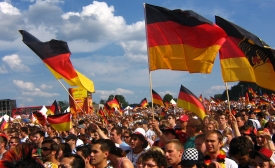EU
Europe and Iran have common interests in several areas. In light of their historical and traditional bilateral relations as well as other positive sources, such as the existence of complementary economies, mutually-beneficial cooperation in the fields of energy and technology [...] through both collective and bilateral mechanisms, it is possible to actively pursue the struggle against the important threats such as terrorism, violence, extremism, drug trafficking.

Some thoughts on country rankings.
In the UN Palace of Nations, ‘The International Law of Youth Rights’ was launched. It contains both source document and commentary on the historical trends to elaborate and codify international instruments and standards in this field, as well as action taken by governmental, intergovernmental, and non-governmental organizations to promote and protect youth rights.
How can the EU and China forge closer ties and respond to the challenges and opportunities ahead? One way is best captured by the concept of network diplomacy. In other words, managing EU-China relations is about widening and broadening the policy agenda, integrating a wider array of actors, and developing more channels of communication.

PD News headlines looked back on the diplomatic fails and breakthroughs of 2016 thus far.
In an effort to better Greece's international image, the country's Department of Foreign Affairs has stated it will strengthen ties with the Greek diaspora to fend off the stigma of 'Grexit' to a more appropriate 'Greform' (Greek reform), following the effects of its economic crisis.
The President Suñol Box at the Camp Nou had some very special guests today in the form of the regional, state, European and Latin American MPs that are in Barcelona to monitor Sunday’s elections to the Catalan Parliament. FC Barcelona has formed part of the Council for Public Diplomacy in Catalonia (DIPLOCAT), [...] to inform the outside world about Catalonia and at same time raise its profile internationally.
China’s overall economic and strategic interests now seem to go hand in hand with a willingness to engage with Europe culturally.This move beyond economics and normal diplomacy towards ‘a meeting of minds and souls’ is taking place at a time when China itself has entered a new phase of internal growth, one which has made the question of culture and soft power a core strategic priority for the country’s future growth and prosperity.







